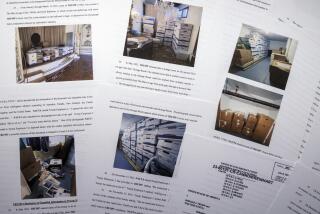Judges Told to Dress Casually in ‘Blue-Collar’ Court
- Share via
‘Maybe we should show up and make them feel really comfortable by wearing bib overalls.’
Clayton Robins
workers’ compensation judge
When workers’ compensation court convened at 9 a.m. Friday in the State Office Building in Van Nuys, two of the nine hearing rooms sported extra adornment. Sandwiched between the U. S. and California flags, a black robe hung from a coat rack.
Overlooked by most of the attorneys and clients who conducted business there, the robes hold special symbolism for workers’ compensation judges Lester B. Volchok and Clayton Robins.
The two believe that judges who decide job-related injury disputes between workers and employers should wear robes, just like their counterparts in criminal and civil courts throughout the state. But their superiors have warned them that it would be an act of “insubordination” to don the gowns, they said.
At issue is whether workers’ compensation court should be a stately tribunal, as the judges favor, or casual and unintimidating to the average worker, as the judges’ superiors would have it.
Volchok and Robins, along with eight other judges in West Los Angeles, have filed grievances with their employer, the state Department of Industrial Relations, seeking permission to wear black robes over their business suits.
Until the issue is resolved, Volchok and Robins said, they will hang the borrowed gowns on a rack in their courtrooms in a simple gesture of protest.
“Instead, I’ll wear last year’s sport coat, which I can barely button across my paunch,” said Robins jokingly. “That’s what management considers appropriate attire.”
The judges, whose trial rulings are final unless appealed to the Workers’ Compensation Appeals Board, maintain that decorum is warranted in hearings at which weighty issues of insurance coverage are decided.
But in a Feb. 27 letter to judges, management officials stated that the courts are a “working person’s forum” for resolution of compensation disputes and should be informal.
“While we respect your desire to professionalize the image of a workers’ compensation judge, the wearing of judicial robes or other trappings of office is inappropriate,” the letter said.
Department officials could not be reached for further comment.
Volchok wore his robe for four days last month and Robins for one day before supervisors warned them against “insubordination,” they said.
“When they say ‘working person’s forum,’ what they mean is ‘blue collar,’ ” Robins said in an interview. “Maybe we should show up and make them feel really comfortable by wearing bib overalls.”
Although long debated, the issue reached its zenith two months ago when Westside judges sent a letter to management saying they had purchased robes for $125 each and intended to wear them beginning March 16, according to Westside Presiding Judge Hubert A. Rappoport.
Rappoport said he and his fellow judges backed off when they received the memorandum from superiors.
The nine judges in Van Nuys had voted to join their West Los Angeles colleagues and wear robes the same day, but seven of them relented when the order was issued, Volchok said.
Workers’ compensation judges, who are employees of the Industrial Relations Department, have long struggled for greater respect after years of being called “referees.” In 1975, their title was changed in department circles to “judge,” an action that became law on Jan. 1, 1986, with a legislative amendment.
Then, early last year, the legislative counsel’s office issued an opinion stating that workers’ compensation judges are not required by the Government Code to purchase and wear robes, as other judicial officers are, but neither are they forbidden.
Judges interpreted that opinion as license to don robes if they desired, Rappoport said.
Not Just Blue-Collar Cases
“All of our trials are done under formal procedures,” Rappoport said. “Witnesses are sworn, and testimony is taken down by a court reporter. Everywhere you go, even in juvenile court, they are wearing robes.”
Volchok said the courts do not deal exclusively with injured blue-collar workers. In fact, he said, the Van Nuys and West Los Angeles offices adjudicate many cases involving professionals, some seeking payment for stress-related injuries.
“The law says judges should wear robes,” Volchok said. “The law also says that we are judges. It seems clear to me.”
More to Read
Inside the business of entertainment
The Wide Shot brings you news, analysis and insights on everything from streaming wars to production — and what it all means for the future.
You may occasionally receive promotional content from the Los Angeles Times.









